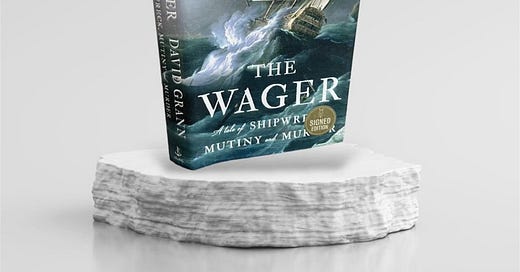By Guest Contributor Marc Friedman
The Wager by David Grann is a story of bravery and resilience on the high seas, in a literary tradition that stretches from Herman Melville’s Moby Dick to Ernest Hemingway’s Old Man and the Sea to contemporary author Nathanial Philbrick’s In the Heart of the Sea.
More importantly, Grann’s book reminds us that all nations “tailor their stories” to promote favorable views of their histories and to minimize or even hide their failures.
The author of the acclaimed best-sellers Killers of the Flower Moon and The Lost City of Z, Grann has written a spellbinding book set in the 1740’s when England and Spain were engaged in an oceanic war, each seeking to spread its empire throughout the world.
In 1740, a fleet of seven armed vessels, including the HMS Wager, a square-rigged 28 gun ship, left England intending to sail around Cape Horn at the southern tip of South America, and capture a silver-laden Spanish galleon on its way to China.
Drawing upon a wealth of first-hand accounts found in logbooks, diaries and correspondence, and other documents, Grann paints a chilling picture of the brutal weather and monumental ocean waves that the fleet encountered as it tried to navigate from the Atlantic to the Pacific Oceans around Cape Horn.
Ten months after leaving England, while trying to navigate the violence of the Pacific Ocean, the Wager was caught between two large rock formations just west of Patagonia, a large area off the southwestern coast of South America. There the crew was forced to abandon ship.
All the other accompanying vessels apparently were lost at sea. By the time this shipwreck occurred in 1741, barely half of the crew had survived the journey. Many had already perished from diseases including scurvy and typhus, multiple other illnesses, starvation, shipboard accidents, and drownings.
The survivors found their way to a desolate, rocky island which became known as “Wager Island.” Some took a small lifeboat to shore while others swam. Among the survivors who made it to Wager Island were Captain David Cheap, a noble, courageous and able seaman; gunner John Bulkeley, a skilled and rugged sailor; Lieutenant Robert Baynes, the Wager’s second in command; and midshipman John Byron, the grandfather of the famed poet Lord Byron.
Soon after the castaways reached Wager Island the battle for control of the stranded crew started. Many crewmen had lost confidence in Captain Cheap and blamed him for their predicament. In fact, Cheap killed one of the seamen who questioned his judgment by shooting him in the head.
Gunner Bulkeley and Captain Cheap butted heads disagreeing over an escape strategy. Cheap was determined to jerry rig some small boats and to continue to sail up the coast of Chile and across the Pacific to fulfill the original mission of the fleet - capturing the Spanish galleon and its treasure.
Bulkeley wanted to reverse course and return to England, which he saw as their last chance to save the crews’ lives. An intuitive leader who understood the mindset of his fellow shipmates, Bulkeley organized an opposition group that changed the course of the events that followed.
A year and a half after leaving England, and five months after they landed on Wager Island, Bulkeley executed his mutinous plan. First, he tied up Captain Cheap with rope. Bulkeley’s band of mutineers then misappropriated a small boat that had been brought ashore from the shipwreck.
Leaving Cheap and others to perish on the island, Bulkeley and his co-conspirators sailed north along the coast of Brazil to a Spanish outpost. After being detained by the Spanish military for a few more months, Bulkeley and the other crewmen were allowed to return to England, where they claimed to be brave and honorable men who had miraculously survived a shipwreck, disease, illness, and hostile fire.
However, six months later, another small boat with three emaciated and depleted men – Captain Cheap, Byron and Baynes – landed at a small coastal town in Chile. Cheap told the welcoming party that the 30 others led by Bulkeley, who landed in Brazil months earlier, were not who they pretended to be. He said, “They were not heroes – they were mutineers.”
Once Bulkeley reached England, he began to publicize his journey, claiming that Captain Cheap and others, who Bulkeley had left onshore at Wager Island, were mutineers. Bulkeley no doubt hoped that Cheap, Byron and Baynes, and others who remained on Wager Island, would never be seen again. When Cheap showed up in England claiming that Bulkeley, and not Cheap, had led a mutiny, the parties began hurling allegations at each other.
As required by British Naval law, whenever a ship was lost, a court-martial was convened. At the court-martial, the only charge at issue related to the loss of the Wager. The sole question to be resolved by the court-martial was whether the loss of the Wager was Captain Cheap’s and Lieutenant Baynes’fault?
There were no charges lodged relating to the mutiny,Cheap’s killing of the sailor who questioned his authority, and Bulkeley’s leaving a tied-up Captain Cheap to die on Wager Island.
None of the witnesses, including Bulkeley, testified that the loss of the Wager was Captain Cheap’s responsibility. In fact, a few praised his bravery and skill. After hearing all the evidence including some written witness statements, the Court found “that Captain David Cheap had done his duty and used all means in his power to have preserved His Majesty’s Ship Wager under his command.”
As a result of the trial, Cheap and all other officers and crew were acquitted of the loss of the Wager except for Lieutenant Baynes who received a mere reprimand. Shortly before the shipwreck had occurred, Baynes failed to report the sighting of land to Captain Cheap, which the judges found contributed to the loss of the Wager.
That was the full scope of the court-martial. It was confined to the loss of the Wager. This raises a fascinating question – why was the court-martial so limited in scope? Why wasn’t Bulkeley charged with the mutiny he organized and led, and his attempt to kill Cheap? And why wasn’t Cheap charged with the homicide which clearly violated British Naval Law?
Grann contends there were three reasons why the court-martial tribunal decided to limit the scope of the proceeding. First, Grann suggests, evidence of the whippings of crew members, beatings, stealing, marauding and murder would impair the credibility of the British Empire’s claim that its imperial forces and civilization were superior to all others. England was proud that its officers were not brutes but gentlemen who adhered to the highest standards of civility.
Second, Grann continues, the war against Spain - known as “the War of Jenkins’ Ear” - was calamitous for England. It resulted in20,000 dead and wounded and the loss of 407 ships, and many embarrassing defeats. It was time to let memories of this war quickly recede.
Third, although the Spanish galleon was captured by another English vessel that had been thought lost at sea, the entire venture, beginning with the fleet’s departure from England, had been disastrous; almost 1300 sailors, including many young boys, had perished out of the original 2000 crew members.
The court-martial was a sham. Indeed, it appears the military tribunal was a party to a cover-up. The crime of mutiny was among the most serious at sea, and the penalty for mutineers was death. Mutiny was, and still is, considered threatening to established order, especially when a nation is at war and needs its armed forces as England did in its war with Spain.
In the case of the Wager, the mere allegation of a mutiny would be embarrassing to England and inimical to its national interest. As a result, England wanted to wash the mutiny on the Wager out of its history.
Grann writes, “[t]he official inquiry into the Wager affair was permanently closed. Cheap’s deposition detailing his allegations eventually disappeared from the court-martial files.” In the words of British historian Glynder Williams, the Wager mutiny was “the mutiny that never was.”’
Grann makes one final compelling point. He states “[j]ust as people tailor their stories to serve their interests – revising, erasing, embroidering – so do nations. After all the grim and troubling narratives about the Wager disaster, the empire had finally found its mythic tale of the sea.”
Grann effectively transports the reader to the deck of the Wageras its crew, led by Captain David Cheap, bravely battled ocean waves, hurricane force winds, ice and snowstorms that at times seemed to topple the Wager into the depths of the Pacific Ocean.
By coincidence, as this reviewer was reliving the Wager’s Dangerous journey, I was seated in my New Jersey home with a Nor’easter storm swirling around me. Just outside my reading room there were gale force winds and sheets of rain continuously pelting the windows around me.
The falling rain pounding upon my roof was unrelenting. Never had I read a book where the “sound effects'' were present. This storm took me deeper into the story of the Wager’s heroic battle against the sea. It was an eerie, powerful and unique backdrop to the reading experience.
The Wager is a breathtaking narrative, but the book and saga it reveals also underscore important truths – truths that are relevant to today. History can become so easily corrupted, white-washed and even washed away.
History’s value as a GPS for the future thus becomes diminished. Grann, a brilliant writer and researcher, reminds us of all this once again – and it’s an important reminder that adds to the enduring value of this compelling book.
Mr. Friedman spent 48 years as a trial lawyer. He is now an Executive Coach with MasterMethod (www.mastermethod.co). Mr. Friedman received a B.A degree in Philosophy from The Johns Hopkins University and a Juris Doctor degree from The George Washington University Law School.
Your Invitation to Become a GREATBOOKster
Welcome to "Great Books, Great Minds," where my passion for books takes center stage. This endeavor is more than a project; it's a labor of love that's driven by countless hours of research and writing. It's my way of contributing to a world filled with community, connection, and meaningful conversations, all nurtured by the power of literature.
If you've found this digital newsletter to be a source of inspiration and insight, if you relish the opportunity to explore exceptional books alongside remarkable authors and fellow book enthusiasts, then I'd like to extend a special invitation to you.
Join our community as a valued supporting member with a subscription at just $6.00 per month or $60.00 per year. Your support fuels our literary journey and ensures that we can continue to bring you these enriching experiences.







Sounds fascinating!
Such a great book--the story of the court martial surprised me when I came to it, but Grann’s explanation felt spot on.